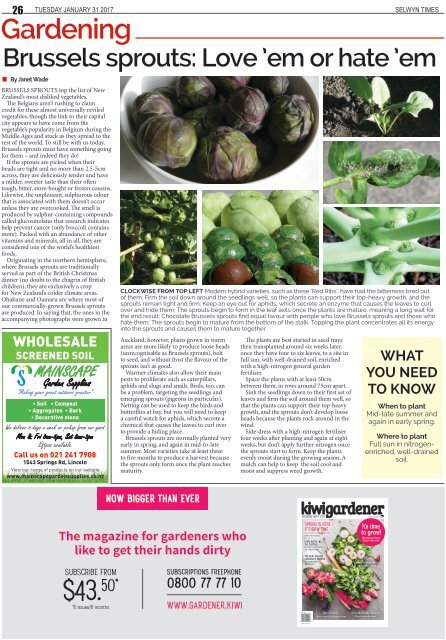Selwyn Times: January 31, 2017
Create successful ePaper yourself
Turn your PDF publications into a flip-book with our unique Google optimized e-Paper software.
26<br />
Tuesday <strong>January</strong> <strong>31</strong> <strong>2017</strong><br />
Gardening<br />
SELWYN TIMES<br />
Brussels sprouts: Love ’em or hate ’em<br />
• By Janet Wade<br />
BRUSSELS SPROUTS top the list of New<br />
Zealand’s most disliked vegetables.<br />
The Belgians aren’t rushing to claim<br />
credit for these almost universally reviled<br />
vegetables, though the link to their capital<br />
city appears to have come from the<br />
vegetable’s popularity in Belgium during the<br />
Middle Ages and stuck as they spread to the<br />
rest of the world. To still be with us today,<br />
Brussels sprouts must have something going<br />
for them – and indeed they do!<br />
If the sprouts are picked when their<br />
heads are tight and no more than 2.5-5cm<br />
across, they are deliciously tender and have<br />
a milder, sweeter taste than their often<br />
tough, bitter, store-bought or frozen cousins.<br />
Likewise, the unpleasant, sulphurous odour<br />
that is associated with them doesn’t occur<br />
unless they are overcooked. The smell is<br />
produced by sulphur-containing compounds<br />
called glucosinolates that research indicates<br />
help prevent cancer (only broccoli contains<br />
more). Packed with an abundance of other<br />
vitamins and minerals, all in all, they are<br />
considered one of the world’s healthiest<br />
foods.<br />
Originating in the northern hemisphere,<br />
where Brussels sprouts are traditionally<br />
served as part of the British Christmas<br />
dinner (no doubt to the chagrin of British<br />
children), they are exclusively a crop<br />
for New Zealand’s colder climate areas.<br />
Ohakune and Oamaru are where most of<br />
our commercially-grown Brussels sprouts<br />
are produced. In saying that, the ones in the<br />
accompanying photographs were grown in<br />
WHOLESALE<br />
SCREENED SOIL<br />
MAINSCAPE<br />
Garden Supplies<br />
“Making your great outdoors greater”<br />
• Soil • Compost<br />
• Aggregates • Bark<br />
• Decorative stone<br />
We deliver 6 days a week or pickup from our yard<br />
Mon & Fri 8am–5pm, Sat 8am–3pm<br />
Eftpos available<br />
Call us on 021 241 7908<br />
1543 Springs Rd, Lincoln<br />
View our range of products on our website<br />
www.mainscapegardensupplies.co.nz<br />
CLOCKWISE FROM TOP LEFT Modern hybrid varieties, such as these ‘Red Ribs’, have had the bitterness bred out<br />
of them; Firm the soil down around the seedlings well, so the plants can support their top-heavy growth, and the<br />
sprouts remain tight and firm; Keep an eye out for aphids, which secrete an enzyme that causes the leaves to curl<br />
over and hide them; The sprouts begin to form in the leaf axils once the plants are mature, meaning a long wait for<br />
the end result; Chocolate Brussels sprouts find equal favour with people who love Brussels sprouts and those who<br />
hate them; The sprouts begin to mature from the bottom of the stalk. Topping the plant concentrates all its energy<br />
into the sprouts and causes them to mature together.<br />
Auckland; however, plants grown in warm<br />
areas are more likely to produce loose heads<br />
(unrecognisable as Brussels sprouts), bolt<br />
to seed, and without frost the flavour of the<br />
sprouts isn’t as good.<br />
Warmer climates also allow their main<br />
pests to proliferate such as caterpillars,<br />
aphids and slugs and snails. Birds, too, can<br />
be a problem, targeting the seedlings and<br />
emerging sprouts (pigeons in particular).<br />
Netting can be used to keep the birds and<br />
butterflies at bay, but you will need to keep<br />
a careful watch for aphids, which secrete a<br />
chemical that causes the leaves to curl over<br />
to provide a hiding place.<br />
Brussels sprouts are normally planted very<br />
early in spring, and again in mid-to-late<br />
summer. Most varieties take at least three<br />
to five months to produce a harvest because<br />
the sprouts only form once the plant reaches<br />
maturity.<br />
The plants are best started in seed trays<br />
then transplanted around six weeks later,<br />
once they have four to six leaves, to a site in<br />
full sun, with well-drained soil, enriched<br />
with a high-nitrogen general garden<br />
fertiliser.<br />
Space the plants with at least 50cm<br />
between them, in rows around 75cm apart.<br />
Sink the seedlings down to their first set of<br />
leaves and firm the soil around them well, so<br />
that the plants can support their top-heavy<br />
growth, and the sprouts don’t develop loose<br />
heads because the plants rock around in the<br />
wind.<br />
Side-dress with a high-nitrogen fertiliser<br />
four weeks after planting and again at eight<br />
weeks, but don’t apply further nitrogen once<br />
the sprouts start to form. Keep the plants<br />
evenly moist during the growing season. A<br />
mulch can help to keep the soil cool and<br />
moist and suppress weed growth.<br />
WHAT<br />
YOU NEED<br />
TO KNOW<br />
When to plant<br />
Mid-late summer and<br />
again in early spring.<br />
Where to plant<br />
Full sun in nitrogenenriched,<br />
well-drained<br />
soil.<br />
now bigger than ever<br />
The magazine for gardeners who<br />
like to get their hands dirty<br />
SubScribe from<br />
$43. 50*<br />
*6 issues/6 months<br />
SUBSCRIPTIONS FREEPHONE<br />
0800 77 77 10<br />
www.gaRdeNER.kiwI<br />
growing with you<br />
SprIng Is here –<br />
It’S Sow Time<br />
how to get the best results from<br />
seeds and seedlings<br />
100% NatIve In<br />
The capItal<br />
Unravelling the secrets of<br />
Otari-wilton Bush<br />
The New Zealand<br />
landscape awards<br />
The people behind<br />
the projects<br />
$7.90 incl. GST<br />
Save our roSeS<br />
How a rose register is protecting our heritage<br />
September 2016 | 100%<br />
It’s time<br />
to grow!<br />
New look and more<br />
content than ever!<br />
MeeT LeSTer Brice<br />
A Garden coach<br />
auckland Botanic GardenS<br />
Why we love our public grounds<br />
ISSN 2423-0219


















